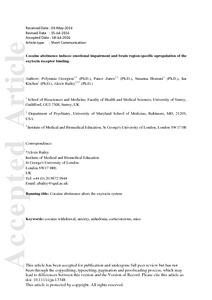Georgiou, P; Zanos, P; Hourani, S; Kitchen, I; Bailey, A
(2016)
Cocaine abstinence induces emotional impairment and brain region-specific upregulation of the oxytocin receptor binding.
European Journal of Neuroscience, 44 (7).
pp. 2446-2454.
ISSN 1460-9568
https://doi.org/10.1111/ejn.13348
SGUL Authors: Bailey, Alexis
![[img]](https://openaccess.sgul.ac.uk/108102/1.hassmallThumbnailVersion/accepted%20Georgiou_et_al-2016-European_Journal_of_Neuroscience.pdf)  Preview |
|
PDF
Accepted Version
Available under License ["licenses_description_publisher" not defined].
Download (637kB)
| Preview
|
Abstract
The key problem in treating cocaine addiction is the maintenance of a drug-free state since negative emotional symptoms during abstinence often trigger relapse. The mechanisms underpinning the emotional dysregulation during abstinence are currently not well-understood. There is evidence suggesting a role of the neuropeptide oxytocin in the modulation of drug addiction processes. However, its involvement during long-term abstinence from cocaine use remains unclear. In this study, we aimed to behaviourally characterize a mouse model of long-term cocaine withdrawal and assess the effect of chronic cocaine administration and long-term cocaine abstinence on the central oxytocinergic system and the Hypothalamic-Pituitary-Adrenal-axis. Fourteen-day escalating-dose cocaine administration (3 x 15-30 mg/kg/day) and 14-day withdrawal increased plasma corticosterone levels and oxytocin receptor (OTR) binding in piriform cortex, lateral septum and amygdala. A specific cocaine withdrawal-induced increase in OTR binding was observed in the medial septum. These biochemical alterations occurred concomitantly with the emergence of memory impairment, contextual psychomotor sensitization and an anhedonic and anxiogenic phenotype during withdrawal. Our study established a clear relationship between cocaine abstinence and emotional impairment in a novel translationally-relevant model of cocaine withdrawal and demonstrated for the first time brain region-specific neuroadaptations of the oxytocin system, which may contribute to abstinence-induced negative emotional state. This article is protected by copyright. All rights reserved.
| Item Type: |
Article
|
| Additional Information: |
This is the peer reviewed version of the following article: Georgiou, P., Zanos, P., Hourani, S., Kitchen, I. and Bailey, A. (2016), Cocaine abstinence induces emotional impairment and brain region-specific upregulation of the oxytocin receptor binding. Eur J Neurosci. 44: 2446–2454, which has been published in final form at doi:10.1111/ejn.13348. This article may be used for non-commercial purposes in accordance with Wiley Terms and Conditions for Self-Archiving. |
| Keywords: |
anhedonia, anxiety, cocaine withdrawal, corticosterone, mice, Neurology & Neurosurgery, 1109 Neurosciences, 1702 Cognitive Science, 1701 Psychology |
| SGUL Research Institute / Research Centre: |
Academic Structure > Institute of Medical, Biomedical and Allied Health Education (IMBE)
Academic Structure > Institute of Medical, Biomedical and Allied Health Education (IMBE) > Centre for Biomedical Education (INMEBE) |
| Journal or Publication Title: |
European Journal of Neuroscience |
| ISSN: |
1460-9568 |
| Language: |
ENG |
| Publisher License: |
Publisher's own licence |
| Projects: |
|
| PubMed ID: |
27453431 |
| Dates: |
| Date |
Event |
| 2016-10-02 |
Published |
| 2016-07-25 |
Published Online |
| 2016-07-18 |
Accepted |
|
 |
Go to PubMed abstract |
| URI: |
https://openaccess.sgul.ac.uk/id/eprint/108102 |
| Publisher's version: |
https://doi.org/10.1111/ejn.13348 |
Statistics
Item downloaded times since 02 Aug 2016.
Actions (login required)
 |
Edit Item |



